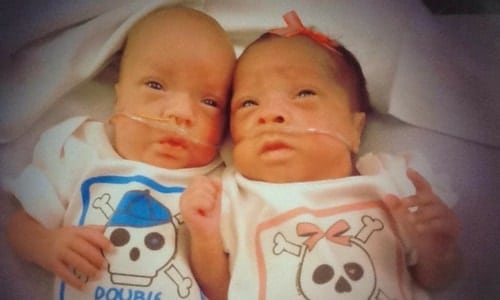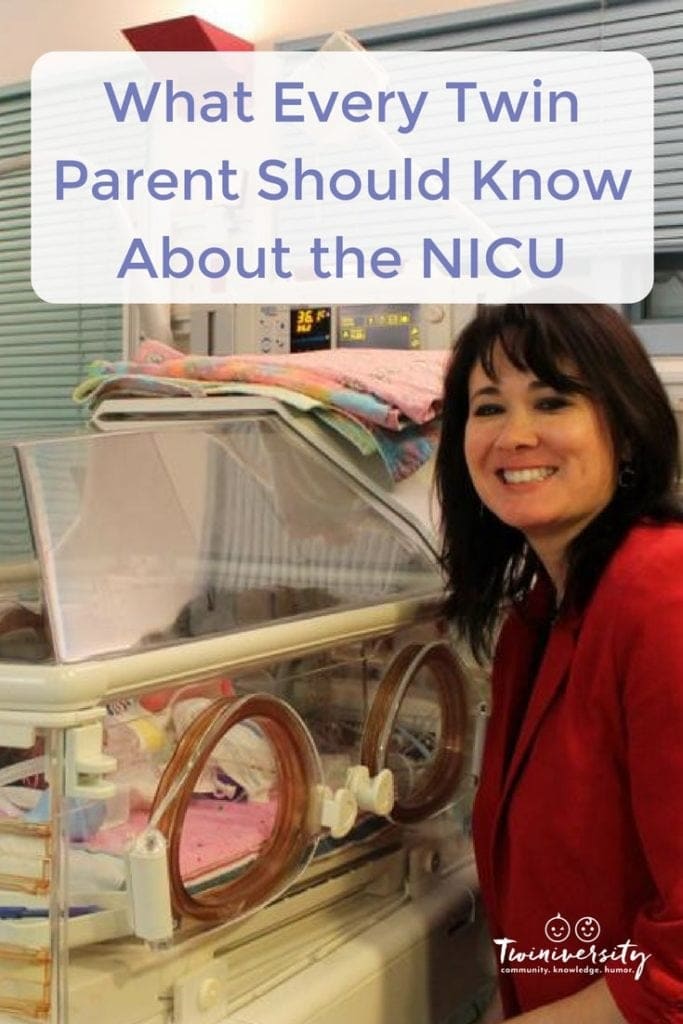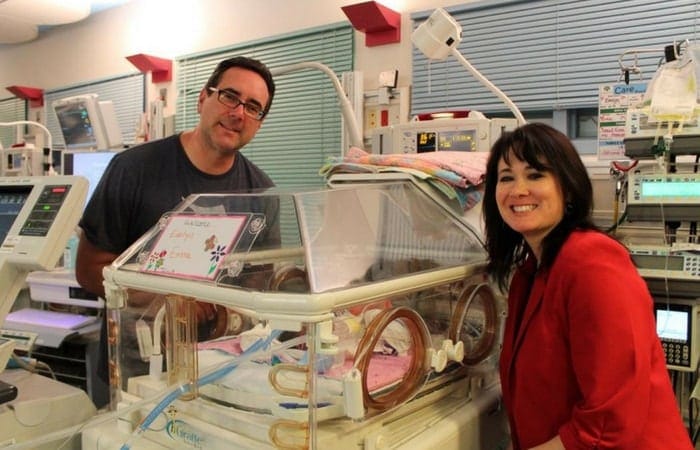Last updated on July 30th, 2024 at 06:42 pm
No one imagines their twins will be in the NICU. But if it happens to your twins check out what this twin mama says you should know about the NICU.
I’ll never forget the look on my husband’s face when he answered the call from our adoption agency, offering us a placement. “How do we feel about twin preemies?” he asked, already knowing my answer. “Ecstatic!” I practically screamed. Obviously, it was the twins I was ecstatic about. More worrisome was the fact that my babies were born at 27 weeks, and our social worker warned us to expect a 3-month NICU stay.
I really couldn’t comprehend a NICU stay that long. My much-younger brother had spent a month in the NICU, and my niece had spent a week. Part of me was in denial, thinking that despite their precarious conditions my babies would also have a relatively short stay. Spoiler alert: my twins spent 10.5 and 11 weeks in the NICU, but today they are completely healthy. The NICU can be a terrifying, intimidating place, but it can also be a warm, supportive resource. The more you can prepare for a possible NICU stay, the better equipped you’ll be if that day does arrive.
The NICU Can Be a Cold Environment
It’s freezing in the NICU, literally and sometimes figuratively. The cold temperatures are needed to keep germs at bay, and your babies will be warm in their incubators, but bring a sweater. I would drive straight from my office to the hospital and would exchange my suit jacket for a heavy hoodie and my dress shoes for warmer casual shoes. Looking back, I think a small blanket would have been helpful to provide additional comfort during those long hours.

Our family had the best possible NICU experience, with friendly nurses and doctors and support staff. There was only one nurse I found to be icy in demeanor, and I trusted my instincts: I requested that she not be assigned to my twins. Because this was the only complaint I’d made and I asked in a polite manner, my wishes were respected. Not all of the nurses need to be your best friend – they’re human after all, with their own lives. But if you truly encounter one you have an objection to, you should trust yourself and share your concerns with the other staff.
Feed the Nurses
I don’t throw the term “hero” around lightly, but NICU nurses truly are my heroes. They work long hours doing a difficult and stressful job, while often dealing with parents who are (justifiably) emotional wrecks. A NICU nurse was part of the team that picked my babies up from a different hospital and transported them to the NICU a half-hour away. That nurse literally helped save my children’s lives. When my daughter started choking and stopped breathing several different times during her NICU stay, it was often the nurses who saved her.
These same incredible women and men joked with us during the day, chatted with my mother and sister, taught me how to bathe my babies, demonstrated how to fold the too-large diapers to fit snugly, and made me birthday cards from my children. There will never be enough you can do to thank them, but go ahead and try anyway. I found that the nurses –and the rest of the staff – really appreciated food. Whether it was a pastry basket from a local bakery, a tray of subs from Jimmy John’s, or my mother’s homemade cookies, we tried to bring them something periodically to show our thanks. Whatever you do, don’t forget to include the nighttime rotation, who often miss out. The nurses genuinely appreciated our efforts and went out of their way to thank us.
Are your twins heading in for a NICU stay? Learn what a neonatologist is and how they will help your babies.

The Alarms Are Terrifying
Your babies may end up being connected to respiratory and heart rate monitors, and the first time you hear one sound a warning alarm you’re going to be terrified. You’ll wonder what’s wrong and why the staff isn’t responding quickly enough. Try to remain calm. The staff is well-trained in the nuances of the alarms and know that every alarm isn’t necessarily an emergency. On the other hand, you may become so accustomed to the monitors that you might become dependent on them. One wise nurse advised me to ignore the alarms and monitors, and just pay attention to my babies, “Because you won’t have the monitors at home.” She was right.
There Will Be Setbacks
My delusions of having my twins home within a month were, of course, swiftly dispelled as doctors explained to me the severity of my children’s health challenges. They weren’t insurmountable, but they did take time, and I had to learn patience. For every milestone achieved – another ounce gained, the ability to breathe without assistance – there was a setback. My daughter continued to require oxygen. My son could not maintain an acceptable body temperature in an open-air crib. Neither baby would drink enough formula from a bottle. It would have been easy to fall into despair, but the staff encouraged us to see the bigger picture: our twins were doing remarkably well and we hadn’t even reached their due date. Your twins might not progress as fast as you’d like, but don’t give up hope. Every day is a success.
Want to learn more about NICU nurses, what they do,
and how they are a critical part of your twins’ care team?
Take Advantage of the Resources
Every NICU has a ton of resources, and you shouldn’t be afraid to ask about them and to use them. Your NICU stay may be the one period of time when you have this much assistance, so take advantage of it. Some classes may be mandatory, such as infant CPR and car seat training. Learn everything you can and ask as many questions as you can. Ask for visits with the hospital chaplain if you need spiritual support. If you have financial challenges, ask about free formula or coupons for formula. Again, if you have been kind to the staff, they will go out of their way to help you or connect you with help.

The NICU experience can seem grueling and endless, but always remember that it’s temporary. When you’re in the midst of the experience, it can be easy to forget this simple fact, but let it become your mantra. It’s temporary.

Dawn Krzisnik is the bemused mother of 4-year-old boy/girl twins, Evelyn and Holden. She is married to David, a high school teacher and children’s book author. She lives in Michigan with her family and her Toy Manchester Terrier, Scout. Dawn works from home as a legal transcript proofreader. In previous lives she worked as a project manager and as a marriage, family, and child therapist for community mental health agencies. You can follow Dawn’s Facebook page, Twinsition.







